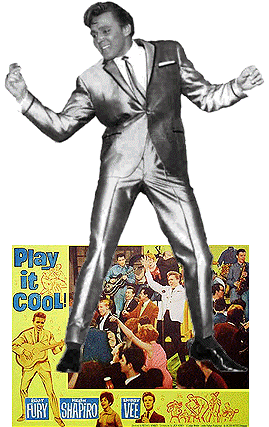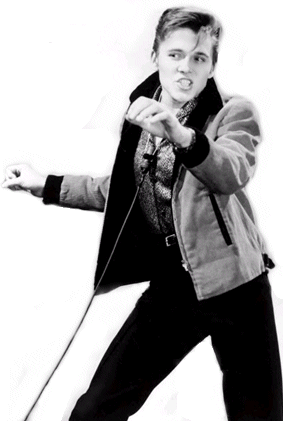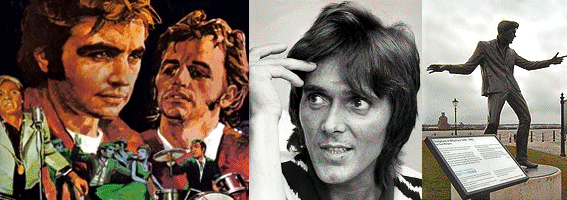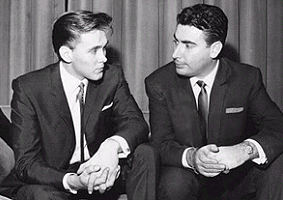Sixties
City presents
a wide-ranging series of
articles on all aspects of the Sixties, penned by the creator of the iconic
60s music paper Mersey
Beat
|
Sixties
City presents
a wide-ranging series of
articles on all aspects of the Sixties, penned by the creator of the iconic
60s music paper Mersey
Beat
|
|||||
|

|
A
Liverpool singer, born Ronald Wycherley on 17th April 1941. His parents
were Albert and Jean and he had a brother, Albert, three years younger,
who also became a pop singer, calling himself Jason Eddie.
Prior to the Beatles, he was Liverpool’s most successful pop artist. At 11, he started music lessons, taking up the piano, and he got his first guitar at age 14. By 1955, as the skiffle boom began, he was leading his own local group, while earning money working on a Mersey tugboat and then as a stevedore. In a small Liverpool studio in 1958 Ronnie cut several songs and sent a demo tape and picture to impresario Larry Parnes. He then went to a Parnes Extravaganza Show at the Essoldo, Birkenhead, for a successful audition. In keeping with Parnes' established proceedure of giving his singers stage names derived from distinctive emotions and attributes (Marty Wilde, Johnny Gentle, Vince Eager) Ronald Wycherley became Billy Fury. Billy became Decca’s biggest-selling artist of the time, with 26 hits between 1961 and 1966. During this period he spent 268 weeks in the charts with hits that included ‘Halfway To Paradise’, ‘Jealousy’, ‘I’ll Never Find Another You’, ‘Last Night Was Made For Love’, ‘Once Upon A Dream’, ‘Like I’ve Never Been Gone’, ‘Wondrous Place’ and ‘In Summer’. Fury was reared in the same area of Liverpool as Ringo Starr, the Dingle, where he attended St Silas’s Junior School and Dingle Vale Secondary School, along with Ringo and Fury’s best friend, Billy Hatton, who was later to become a member of the Fourmost. On 10th May 1960, Billy and his manager, Larry Parnes, attended an audition at the Wyvern Club in Seel Street, Liverpool. Parnes had been impressed by the Liverpool bands appearing in a Gene Vincent concert and had asked one of his assistants, Mark Foster, to contact local club owner Allan Williams to arrange an audition. He wrote: “Duffy Power will be touring Scotland from June 2nd to 11th inclusive and Johnny Gentle will be touring Scotland from June 16th to 25th. For these two periods, as agreed, we are willing to pay your groups £120, plus the fares from Liverpool.” The letter also added: “We will make arrangements for Mr. Parnes to come and audition your groups to select the most suitable. He will also bring Billy Fury as Billy will want one of these four groups for his own personal use. Incidentally, the idea of Billy wanting a group from his own home town will provide several interesting press stories and publicity tie-ins". There were actually five Mersey groups at the audition: Gerry & The Pacemakers, Cass & The Cassanovas, Cliff Roberts & The Rockers, Derry & The Seniors and The Silver Beatles. During the afternoon, Beatles bass guitarist Stuart Sutcliffe drew Fury’s portrait and John Lennon asked for, and received, his autograph. Although Fury didn’t get his backing group, the Silver Beatles were chosen to tour Scotland with Johnny Gentle. Billy himself decided that he liked the Silver Beatles best, although Parnes hadn’t liked the appearance or age of their drummer Tommy Moore. |
 |
  |
All
four Beatles went to the Empire Theatre, Liverpool on Sunday 21st October
1962, prior to their Cavern appearance that evening, to see Billy perform
at a show there. Fury made his film debut in 1962 in Michael Winner’s
‘Play It Cool’ and also starred in ‘I’ve Gotta Horse’ in 1965.
The singer had been plagued by ill health since he was a child, when rheumatic fever had left him with a weak heart. Several tour appearances had to be cancelled due to his recurring heart problems and he was hospitalised on a number of occasions, which caused him to cease live performances in 1967 and spend most of his time on a farm, breeding horses. He appeared with Ringo Starr in a cameo role as Stormy Tempest in ‘That’ll Be the Day’ in 1973, performing ‘Long Live Rock’, a number written specially for him by Pete Townshend. During the filming there was a jam session with Ringo on lead guitar, David Essex on bass, Graham Bond on drums, Harry Nilsson on tambourine and Billy Fury on vocals. Billy’s heart finally gave out on Friday 28th January 1983, at a time when he was in the process of recording a new album and had just had a new single enter the charts. |
|
Article
Text
|